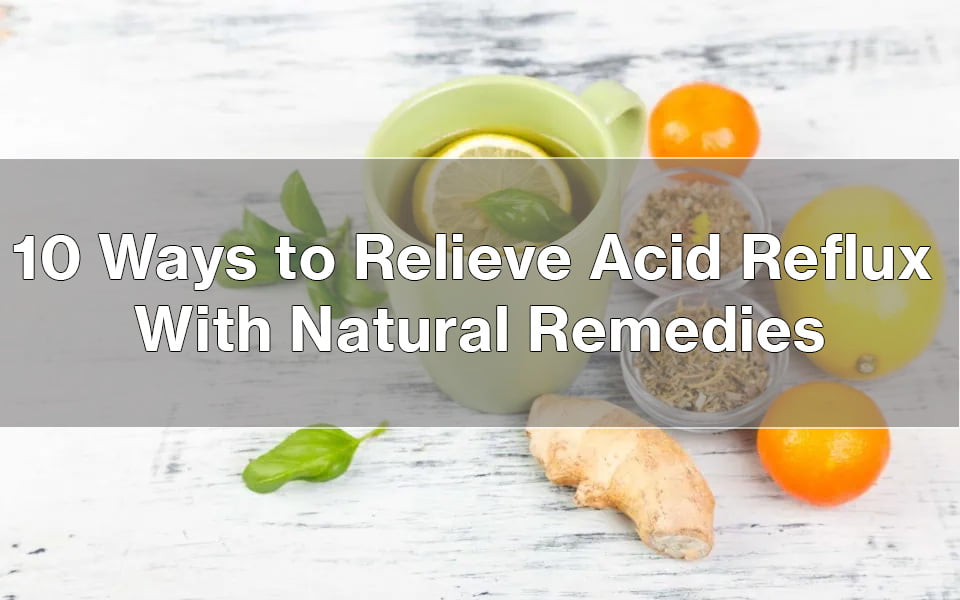Acid reflux, also known as gastroesophageal reflux disease (GERD), is a common condition that affects many people worldwide. It occurs when stomach acid flows back into the esophagus, leading to symptoms like heartburn, regurgitation, and discomfort. While over-the-counter and prescription medications are commonly used to manage this condition, many individuals seek natural remedies to alleviate their symptoms without relying on pharmaceuticals. Scientific research has begun to explore the efficacy of various natural treatments, offering hope and alternative options for those suffering from acid reflux.
10 Natural Remedies for Acid Reflux
1. Aloe Vera Juice
Aloe vera is renowned for its soothing and anti-inflammatory properties. A study suggests that consuming aloe vera juice can reduce symptoms of acid reflux by calming the gastrointestinal tract
2. Ginger
Ginger has been used for centuries as a natural remedy for various gastrointestinal issues, including nausea and acid reflux. Research indicates that ginger can help by neutralizing stomach acid, improving digestion, and reducing inflammation in the esophagus.
3. Chamomile Tea
Chamomile tea is known for its calming effects, which can be beneficial for those suffering from acid reflux. Drinking chamomile tea may help reduce inflammation in the esophagus and soothe the digestive tract, potentially easing reflux symptoms.
4. Licorice Root
Licorice root has properties that can enhance the mucous coating of the esophageal lining, offering protection against stomach acid. Some studies suggest that deglycyrrhizinated licorice (DGL) can be an effective natural remedy for acid reflux.
5. Melatonin
Emerging research has explored the use of melatonin, not only as a sleep aid but also for its potential in treating GERD. Melatonin is believed to improve the function of the lower esophageal sphincter and protect the esophagus from acid exposure.
6. Apple Cider Vinegar
While it may seem counterintuitive to treat acid with an acidic substance, some proponents believe that apple cider vinegar can help balance stomach pH and aid digestion. However, scientific evidence is mixed, and more research is needed to confirm its effectiveness.
7. Baking Soda
Baking soda (sodium bicarbonate) is a quick, inexpensive remedy for heartburn. It works by neutralizing stomach acid, providing temporary relief from symptoms. However, it should be used cautiously due to its high sodium content.
8. Slippery Elm
Slippery elm contains mucilage, a substance that becomes a slick gel when mixed with water. This gel can coat and soothe the stomach and esophagus, potentially relieving acid reflux symptoms. Clinical studies are needed to fully understand its benefits.
9. Dietary Changes
Adjusting one’s diet to avoid trigger foods (such as spicy foods, caffeine, and alcohol) and incorporating alkaline foods can significantly reduce acid reflux symptoms. Scientific evidence supports the role of dietary modification in managing GERD.
10. Weight Management
Research has consistently shown that weight loss can significantly reduce symptoms of acid reflux. The reduction in pressure on the stomach and lower esophageal sphincter can decrease the likelihood of acid reflux.
One other natural remedy that has gain enormous popularity (because it works) is the wedge pillow. The wedge pillow raises your upper body and prevents the acid rising up from your stomach. We have tested several wedge pillows and found that the one that offers the best comfort and performance is the Sleepnitez wedge pillow. Get the Sleepnitez Wedge Pillow Here and start sleeping better today!
The remedies listed above are widely recognized for their potential benefits. It’s important to note that while these natural remedies can provide relief, they may not work for everyone and should not replace medical treatment without consulting a healthcare professional. As research in this area continues to grow, it is hoped that more definitive evidence will emerge to support the use of these natural treatments. Individuals suffering from GERD should consider these remedies as part of a holistic approach to managing their condition, alongside any medical advice received.



